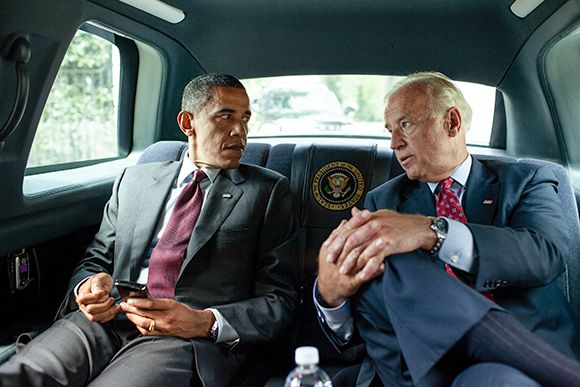During the Trump years, it is hard to deny that a faint miasma of disappointment has lingered over the reputation of his predecessor. Yes, Barack Obama might personally be one of the most attractive presidents ever—charming, decent, eloquent—but how come he was succeeded by such a stinker? If he hadn’t exactly let Trump in, he hadn’t kept him out either. On the left, figures like Bernie Sanders and “public philosopher” Michael Sandel have argued that Obama’s rhetoric prepared the way for the Donald. I don’t think this is really true, and as the clouds lift a little and the Great Heffalump is dragged by painful degrees out of the White House, I think we can begin to see why it isn’t—especially if we read this first volume of Obama’s presidential memoirs with the attention it deserves.
Dreams from my Father was probably the best book ever written by someone who later became President of the United States. A Promised Land is probably the best book ever written about being president by a former President of the United States. It rolls along at the unhurried pace of “Old Man River,” or Barack Obama’s own leisurely gait—“a Hawaiian walk,” as his wife calls it. Michelle Obama is a feisty, caustic presence throughout proceedings, never backward with a corrective to her husband’s graceful but undeviating pursuit of his ambitions. When he told her that he was thinking of running for president, after less than 18 months in the Senate, “she gave me a hard look and got up from the couch. ‘God, Barack, when is it going to be enough?’”
He begins by rehearsing the strangeness of his background, previously set out so beautifully in Dreams. The child of a talented but wayward Kenyan, Barack Senior, who walked out when he was a baby and resurfaced for only a month when Barack was 10, he was brought up partly by his white grandparents in Hawaii, while his mother went on with her voluntary work in Indonesia: “I was from everywhere and nowhere, a combination of ill-fitting parts, like a platypus or some imaginary beast, confined to a fragile habitat, unsure of where I belonged.” Has any other president ever thought of himself as a platypus?
Like others in his disoriented situation, he clung all the more fiercely to his American identity, never blind to his country’s faults but never buying into the critique that American exceptionalism was only a front for rapacity and racism, and always anxious to appeal to what Lincoln called “the better angels of our nature.”
What Obama communicates so well in this book no less than in his public persona is how comfortable he is in his own skin and how at ease in America. As he ambles along the west colonnade of the White House gazing out at the magnolias and crab apples beyond the lawn, or steps out on to the rear platform of the vintage train carrying him to his inauguration and feels the wind cut against his face while he waves to people gathered along the line, you sense how in love he is with his country.
His instinctive, almost sensuous, patriotism is of course just what his opponents sought from the beginning to discredit and deny. They pounced on Michelle’s careless remark on the runaway success of his campaign for the Democratic nomination: “For the first time in my adult lifetime, I’m really proud of my country.” Already the likes of the Drudge Report and Fox News were giving airtime to the rumours that Obama had been schooled in an Indonesian madrasa, that he wasn’t an American citizen, and so on.
[su_pullquote]“As he ambles along the west colonnade of the White House gazing out at the magnolias and crab apples beyond the lawn, you sense how in love he is with his country”[/su_pullquote]His almost unearthly calm—“no drama Obama”—did reassure the public. Yet his formidable aide, David Axelrod, mused that “you may be a little too normal, too well-adjusted to run for president.” He sometimes seemed too professorial, too solemn. The Axe complained that “your problem is, you keep trying to answer the question.” There remained a damaging suspicion of a concealed lofty elitism, verging on contempt for the white working-class voters he needed so badly. Why, he was asked in spring 2008, did so many of them stubbornly go on voting Republican against their own material interests? Well, he replied, in “a lot of small towns in the Midwest, the jobs have been gone now for 25 years and nothing’s replaced them.” And then he couldn’t resist adding: “So it’s not surprising then that they get bitter, they cling to guns or religion or antipathy toward people who aren’t like them, or anti-immigrant sentiment, or anti-trade sentiment as a way to explain their frustrations.”
Obama is still sore with the supposedly sympathetic citizen reporter who recorded these remarks. But he did utter them, just as Hillary Clinton in 2016 did denounce “the basket of deplorables” who, she said, made up half of Donald Trump’s supporters and who were “racist, sexist, homophobic, xenophobic, Islamophobic, you name it.” By all means, insult your political opponents, but it is never a good idea to insult voters, even those unlikely to vote for you.
This remains today the core of the indictment against both Hillary Clinton and Obama—that they are rather scornful of the people who have been left behind by globalisation, technology and modern life generally.
Worked hard into many of Donald Trump’s speeches, the charge is readily embraced by people who happily boast of being “the deplorables,” in the same way as the British Expeditionary Force, after the Kaiser called them “a contemptible little army” in 1914, were proud to call themselves the Old Contemptibles. But the thrust of the accusation is rife on the liberal left too.
In his fashionable polemic, The Tyranny of Merit, Michael Sandel takes aim specifically at Hillary Clinton and Obama, identifying them as falling into the trap described 60 years ago by Michael Young in The Rise of the Meritocracy. The obsession with worldly success means that “those who land on top come to believe that they deserve their success. And, if opportunities are truly equal, it means that those who are left behind deserve their fate as well.” The “losers,” to use that unlovely word that has now crossed the Atlantic, deserve to be losers.

Sandel points out that Obama has argued that “This is a country where no matter what you look like or where you come from, if you’re willing to study and work hard, you can go as far as your talents will take you. You can make it if you try.” He computes that Obama has used that last phrase almost as often as the Rolling Stones have sung it—140 times during his presidency alone.
But the sad truth is, Sandel argues, that in a divided society, very few of the poorly educated make it anywhere near the top. And if you’re born to poor parents, you’re less likely to become well educated and tend to stay poor. For those at the bottom today, the American Dream should ring hollow. Yet 70 per cent of Americans continue to believe that the poor can make it out of poverty on their own, while only 35 per cent of Europeans think the same. By contrast, Sandel points out, Trump seldom used “the rhetoric of rising” and proclaimed that “I love the poorly educated.” While Sandel acknowledges—how could he not?—Trump’s bombast and mendacity, he actually regards, if only by implication, Trump’s conception of citizenship as more realistic, and in this one sense more inclusive.
For the left, Obama was ultimately a disappointment. Sandel’s verdict is that “the moral energy and civic idealism he inspired as a candidate did not carry over into his presidency… he bailed out the banks on terms that did not hold them to account for the behaviour that led to the crisis and offered little help for those who had lost their homes. His moral voice muted, Obama placated rather than articulated the seething public anger toward Wall Street. Lingering anger over the bailout cast a shadow over the Obama presidency and ultimately fuelled a mood of populist protest.”
It’s a damning indictment. But is it true? The conspicuous thing about A Promised Land is that it scarcely deploys the rhetoric of rising at all. The only place I noticed it is in the pen portraits of his personal staff and political colleagues. The Democrats’ leader in the Senate, Harry Reid, for example: “Born dirt poor in the small town of Searchlight, Nevada, to a miner and a laundress, he spent his early years in a shack without indoor plumbing or a telephone. Somehow, he had scratched and clawed his way into college and then George Washington University Law School, working as a uniformed United States Capitol Police officer between classes to help pay his way.” In such life stories, there is the unspoken implication that America contains a multitude of such unlikely ascents. But this is emphatically not what the book is mostly about.
On the contrary, Obama speaks constantly of the left behind, of those who face an endless struggle to make ends meet, to find a job, to pay for their healthcare, to raise their children well. He harps on the inequality and the lack of upward mobility that he ultimately attributes to the Reagan years.
At intervals throughout the book, Obama reflects that he has not done enough to help these people. He reproaches himself with his failure to refashion the prevailing narrative, as FDR did—or as Reagan did in the opposite direction, persuading successive generations to see the US government and Washington as their enemy, the swamp that had to be drained: “trapped in my own high-mindedness, I’d failed to tell the American people a story they could believe in.”
[su_pullquote]“The book is an antidote to over-emphasising Trump’s uniqueness. Most of his policy positions were in the Republican playbook long before he strutted onto the stage”[/su_pullquote]But Obama also exhaustively sets out what he did achieve, and the obstacles he had to overcome to achieve it. His critics need to look at the record in detail before they write him off as a show pony who refused at the first fence.
First of all, it isn’t true that he entered the White House in a state of mindless euphoria—“Yes We Can” on speed. He might profess the audacity of hope, but from day one, the Obama team was tough and realistic. They were inheriting a cataclysmic economic crisis. Even with a Democrat-controlled Congress, they knew they had only “a limited window” of opportunity to push their programme through. As his resourceful chief of staff, Rahm Emanuel, put it, “the presidency’s like a new car. It starts depreciating the minute you drive it off the lot.”
Obama might have been inexperienced, but he was never amateurish. Nobody who had graduated from Chicago politics, as he and Emanuel had, was likely to be a softie. His beginnings in state politics were decidedly murky. He secured the party nomination for state senator by keeping the experienced Alice Palmer off the ballot paper because she hadn’t secured enough legitimate signatures in her support. He has often made a show of reluctance to play dirty, but he went for it: “whatever preferences I had for fair play, I didn’t like to lose.” When he was running against Hillary Clinton, herself no softie, she complained that Obama’s “team was routinely engaging in unfair attacks, distortions and underhanded tactics.” And while he tried to hose her down, he had to admit that she “wasn’t entirely wrong.”
The idea that his moral energy leaked away as soon as he got into the White House is baloney. You need only look back at the political history of healthcare in the US to see what he was up against. As far back as 1912, Teddy Roosevelt had run on a platform that included a centralised national health service. He lost. Harry Truman tried the same thing in 1945, and then again in 1949 as part of his Fair Deal package. He was blocked by the American Medical Association and the drug companies and their lobbyists yelling “socialist medicine.” More recently the Democrats were scorched by the failure of the universal healthcare plans of Hillary Clinton, then serving in her husband’s government—a big factor in the Democrats losing the 1994 midterm elections.
Any president who hoped to carry something so fiercely contested had also to reckon with the enduring bugbear of the Senate filibuster, which could be overruled only by mustering 60 of the 100 senators. In retrospect, Obama muses that he should have tried to get Harry Reid to abolish the filibuster—a mere change to the Senate standing rules, which could be effected with a majority of one—at the start of his first term. But how many senators, with their ineffable sense of self-worth, would have allowed a rookie president to tamper with a cherished tradition that could afford them individually extraordinary leverage?

It is understandable that instead Obama should have relied on detaching a handful of Republicans to bolster his own party’s 57 senators and two friendly independents. After all, was not his compulsory insurance scheme modelled on a similar one that Republican Mitt Romney had pioneered in Massachusetts? Leftists may blithely hazard that all that was lacking to get the bill through was moral fibre. But Republicans have maintained their grip on US politics only by unyielding opposition to whatever the Democrats propose. Their obduracy is equalled only by their cynicism. My favourite example here features the appalling Mitch McConnell. The Republican Senate leader, recognising the public mood that something must be done to clean up Wall Street, intimated to Obama’s people that if they found five Republicans to work with on the Dodd-Frank reform bill he wouldn’t do anything to stop them, while he continued in public to maintain that the President’s bill was a monstrosity.
Even the earlier bill to bailout the banks, which Obama inherited from George W Bush, was passed with zero votes from Republican senators. They wanted the freedom to go on inveighing against both crooked bankers and government largesse, while leaving it to the Democrats to keep the economy afloat. As so often in these supposedly generous bailouts, in due course the US Treasury got all its money back.
If the Affordable Care Act and the Recovery Act and the Climate Change Act were watered-down versions of what they might have been, they were watered down by the relentless pressure of Republicans in Washington and the right-wing and industrial lobbies, by the shock jock Rush Limbaugh and the billionaire Koch Brothers. None of this became any easier to navigate when political parties learnt how to use digital messaging and social media—ironically Obama’s Democrats were pioneers in these dark arts.
All the same, these acts were considerable achievements. And when reform ran into the sand in DC, that did not always mean that the cause was dead. The struggle for a minimum wage, for example, went back to the days of the New Deal, when the Supreme Court initially opposed it as a gross interference with the free market. In recent years the Republicans in Congress have prevented the rate from keeping pace with inflation, let alone with wages. But gradually, a growing number of state legislatures have begun to pass their own minimum wage laws.
Of course the legislative possibilities shrank drastically when the Democrats lost the midterms in 2010. But laws securely in place are hard to overturn, as Trump found in his ceaseless efforts to get rid of Obamacare. It was mostly by executive action that Obama began to rebuild the multilateral tradition in foreign policy, a feature of Bush Senior’s tenure that had been badly damaged by Bush Junior—though not as badly damaged as it was to be by Trump.
This first volume of Obama’s memoirs comes to an end in the spring of 2011, with the nail-biting raid to kill Osama bin Laden. It is only in the last few pages that Trump really appears on the stage. We shall no doubt see rather more of him in volume two. But already the right is on the march. We have had the “Tea Party summer” of 2009. What came to be known as “birtherism” was building, encouraged by Trump who was already gearing up to run: “our current president came out of nowhere,” “he doesn’t have a birth certificate.” Obama had posted his Hawaii birth certificate online in 2008 but it made no difference.
At the White House Correspondents’ Association dinner (always a gruesome occasion) in 2011, just as the Black Hawk helicopters were taking off from Jalalabad to get Bin Laden, Obama twitted the Donald about his birtherism: “did we fake the moon landing?” The audience cracked up, with Trump managing a tepid smile. But the laughter didn’t harm him. The more he lied, the more he became the front-runner.
A Promised Land is an antidote to over-emphasising Trump’s uniqueness. Most of his policy positions were entrenched in the Republican playbook long before he strutted on the stage. He was to win the 2016 election, but lost the popular vote by three million, and besides, was it so remarkable that a Republican should win after eight years of a Democrat in the White House? After the 2020 election, we can now see better what was obscured by his monstrous personality: that the past two decades have seen a fairly ordinary alternation between Republican and Democratic administrations—the Democrat advantage in the popular vote being balanced by the Republican edge in the swing states.
When Joe Biden agreed to run with Obama, he insisted that, in any crucial discussion, he should be “the last man in the room” with his boss. As a result, we know exactly what the new president thinks on most things. From the evidence of this book, for example, we know that he was against the mission to kill Bin Laden, in favour of multilateral action abroad and pushing Obamacare as far as it will go. In other words, the polar opposite of Trump. Biden won’t dominate Capitol Hill, but he will be able to reverse the executive actions that have been the daily fare of the Trump years—starting with rejoining the Paris Agreement on climate change. With luck, by 2024 we shall be more or less back to where we were in 2016. There are worse fates.
I have always loved the dying Disraeli’s words to the wealthy socialist, HM Hyndman: “It is a very difficult country to move, Mr Hyndman, a very difficult country indeed, and one in which there is more disappointment to be looked for than success.” Only I think he was really talking about the United States.













